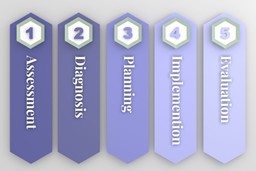Unlocking Psychedelic Transformation Through Mental Health Nursing
Imagine the process of assessing mental health in psychiatric nursing as an intriguing adventure into the human mind, with an added layer of insight from psychedelics. As a trained nurse, I have had the privilege of insight into this fascinating realm. I’m excited to share how these insights can be eye-opening. Especially for those who haven’t ventured into the changes that can occur in personality after psychedelic use.
In the world of nursing, we follow the principles of assessment, diagnosis confirmation, goal identification, planning, implementation, and evaluation. These principles are used to assess a patient’s general health. Psychiatric-mental health nursing, however, adds unique layers. It encourages assessments to embrace cultural diversity and consider social factors and how they relate to physical health. My approach as a nurse has always been about digging into real-life issues. For me, it’s about uncovering their roots and understanding how they affect our mental well-being. I find joy in using metaphors and relatable stories to help patients make sense of their healthcare journeys.
Much like Gen-Z, my personal journey with psychedelics began recently—in 2020—during the Covid-19 lockdown. Throughout this transformative experience, I carefully documented any noted emotional shifts. While many have walked this path before me, I am someone new to psychedelics in adulthood. I believe my perspective can offer valuable insights for those considering it for the first time. These experiences have deepened my understanding of personal growth, and I’m committed to sharing them openly. My aim is to light the way for those who haven’t yet taken this journey. I want to offer them a glimpse into the potential benefits and challenges of exploring the mind through psychedelics.
Applying the Nursing Process to Psychedelics
In this article, I’ll explain how I use the Nursing Process in a unique way. I find it incredibly valuable—not just for dealing with physical pain. It’s also remarkably valuable for assessing various aspects of life, especially in the context of psychedelics. Here, I’m drawing on my experiences and interactions compiled over the past three years.
My goal is to describe my psychedelic journey in relatable terms. I want it to be as understandable as a regular doctor’s visit. I decided to use a simple pain scale, like the one you might see in a hospital. On this scale, zero means no distress at all, (0/10) and ten is the most stressful situation, (10/10). People often use this scale to express their needs and feelings. It’s reliable for both healthcare and the patient because it’s based on how the person feels, from their own perception.
Before beginning my use of psilocybin, I consulted with my doctor to ensure my physical health was in good condition. I sought to gain a better understanding of the distinctions between psychiatric medications and psilocybin. To my surprise, I also noticed an improvement in my physical health after my first-ever dose. I want to emphasize that I do not endorse any illegal substance use. This personal account is intended for educational purposes, not for promoting recreational use.
Initial Assessment: Uncovering Motivations, Dose Frequency, and Transformative Effects of Psilocybin Treatment
Assessment involves data collection, personal statements, and objective, measurable data.
Before Psychedelics:
I initially tried psilocybin mushrooms to alleviate my depression. My first experience was in 2020, followed by a couple more journeys the following year. In 2022, I had the most trips, along with profound moments of rebirth and self-discovery. Historically, I grappled with constant underlying anxiety, often masking it behind a facade of excessive agreeability in society. My mental health was difficult to remedy. I consistently rated my emotional distress as seven out of ten (7/10).
After Psychedelics:
Since my experiences with psychedelics, I wake up with a general sense of gratitude. This was especially true during 2022 when I took a monthly dose of 2.5 grams per session (I did, however, discontinue in November 2022). This gratitude is like the feeling you get when you realize you have an extra hour to sleep in. It’s a lingering sense of safety and comfort. This change came from my newfound ability to make daily choices intuitively. Instead of constantly worrying about others’ schedules or external factors, I now make decisions in alignment with my personal needs.
By January 2023, I’d stopped regular use of psychedelics. I relied solely on meditation and wellness practices to keep my mental health in check. This shift has had a big impact on how I manage my time and life. It has allowed me to pursue my goals without feeling guilty or anxious about the past or future. If I maintained a regular workout routine, I think my stress level would be lower. Currently, however, it averages at three out of ten (3/10).
Diagnosis Assessment: Recognizing Symptoms Affected by Diagnoses and the Impact of Psilocybin
Diagnosis involves confirming diagnosis through clinical judgment, as defined by patient responses. It utilizes a hierarchy of needs to prioritize care.
Before Psychedelics:
Around 2005 I was diagnosed with generalized anxiety disorder, chronic post-traumatic stress disorder, and an inflammatory disorder of unknown origin. Once I embarked on my first experience with psilocybin, I had already stopped taking my SSRIs two years prior. I had also stopped taking any other gastrointestinal medications.
I discovered that introducing legal cannabis into my life resolved many of my ailments in contrast to prescription medications. For example, I used to take Venlafaxine, Zoloft, and Alprazolam to manage my mental health. Additionally, I took Diclofenac and Imitrex for migraines and pain management. My mental health diagnoses and symptomatic inflammatory responses meant my daily pain score averaged eight out of ten (8/10).
After Psychedelics:
Since 2020, after discussions with therapists, I no longer identify with these diagnoses. I now manage my depression through spirituality, a belief I hadn’t held before. I had lived my life primarily as an atheist and remained skeptical of most supernatural concepts.
However, embracing spirituality to resolve inner conflicts significantly helped manage the anxious tension I typically experienced around others. The feeling of tense shoulders is now a rarity, attributable to stressful and frantic days rather than repressed emotions. This has also eliminated the need for antacids.
I no longer suffer from migraines or panic attacks. I now possess the ability to understand, process, and learn from my emotions. I can now release them instead of ruminating on scenarios I cannot control. I believe these changes have greatly impacted my diagnoses of anxiety and PTSD, as well as any confusing mood issues. My pain score has dropped to a generalized three out of ten (3/10).
Outcome Identification: Defining Goals for Purposeful Use of Psilocybin
Outcome Identification enables a clear and concise vision of the intended goal.
Before Psychedelics:
My initial aim for managing my mental health and well-being was gaining control over my emotional responses during tough times. I wanted to steer away from that feeling of being frozen like a deer in headlights. I realized that approaching traumatic events with a rational, less emotional mindset instead could be a practical survival strategy. However, I knew dealing with such events was quite different from handling pain from letting go of a loved one.
There was an impending event that had been causing me anxiety and depression. My dog, Patches, whose age remained a mystery, was inevitably going to pass away. Unbeknownst to me as I stressed over it, 2020 brought psychedelics into my life by this point. It transformed how I approached grief and processed it. End-of-life experiences had always been chaotic and emotionally draining for me, especially when they involved loved ones. (10/10)
After Psychedelics:
When Patches showed unmistakable signs that she was ready, I took charge of the entire week. Surprisingly, I had become the pillar of strength in my own life. I orchestrated everything with a clear understanding of both Patches’ needs and my own. There was no room for shame or guilt. First and foremost, I had a deep understanding of what the patient, in this case, Patches, needed, and eventually, myself. Handling the situation came naturally—my goal was to fully immerse myself in the moment, being entirely present with her. Looking back on that day, I feel profound gratitude because I successfully achieved my goal (0/10).
Planning: Safe and Responsible Psilocybin Use, Setting Intentions, and Establishing a Support Network
Planning is setting patient-specific goals that impact care based on specific desires. Effective goals are specific, attainable, and realistic.
Before Psychedelics:
Initially, I had a simple plan: to try psilocybin for recreational purposes. But things took an unexpected turn as I began to notice a gradual reduction in my anxiety. The turning point came after my first weekend of using psychedelics—I spent Sunday processing the experience at home. Surprisingly, on Monday, I felt significantly different. The usual nervousness I experienced while driving was mysteriously absent. I drove calmly and stayed in the right lane., I wasn’t stressed about being on time for work because I had better time management skills, leaving home earlier. This transformation in my personality happened in just 48 hours.
In response to these profound changes, I adjusted my approach to psilocybin. I decided to take it more seriously, dedicating time to research. I even took a break from my nursing career and stayed with my mother while using my savings. The idea of quitting my job only surfaced after experiencing an ego death during one of my psychedelic journeys. During this experience, I realized I had been pushing myself too hard in life, trying too hard to please others. This was even true in everyday situations like highway driving. It became clear that I needed to identify the root of this issue, much like identifying the cause of an adverse reaction to food or medication (9/10).
After Psychedelics:
As I explored higher doses, I considered the benefits of microdosing to manage my well-being without intense hallucinatory experiences. I followed Dr. James Fadiman’s recommended regimen for five weeks. I started noticing positive changes within just four weeks of taking my first small dose in 2021. The most remarkable result was the disappearance of my migraines. I realized that achieving my goals didn’t necessarily require large psychedelic journeys; microdosing provided a practical alternative. I also expanded my support network, connecting with practitioners and fellow users online who shared valuable insights and safe practices for using psilocybin (2/10).
Implementing: Integrating Psilocybin Experiences and Transformations
Implementation is the phase where nursing interventions are put into action as planned.
Before Psychedelics:
To execute the plan, I highlighted the advantages of blending my nursing knowledge with naturopathic remedies and plant medicines. My passion for natural healing has always been present. As I ventured into the nursing field, however, I realized that my role as a Cannabis nurse was fortuitous. It allowed me to integrate the natural remedies I had encountered through patient care at the cannabis clinic. Seeing significant improvements and medication discontinuation in patients further expanded my curiosity about psilocybin’s potential to act similarly (5/10).
After Psychedelics:
The impact of psilocybin on my daily life seems rooted in neurological changes. I no longer harbor constant fear about an uncertain future. Instead, I embrace the present and trust that things will fall into place. This mindset has provided a stable foundation and helped me navigate the unpredictable scenarios of living in spontaneous Florida.
My daily routine now emphasizes mindfulness, meditation, and yoga. I continue to journal and document new insights that arise during meditation sessions. It’s amazing to think that this holistic approach could have been a remedy during the tumultuous phases of my past.
Meditation provides a sense of tranquility, similar to the serenity that follows relief. I have found a natural method for managing my anxiety. Starting and ending each day with meditation serves as a potent tool for realigning my emotions in response to daily events. I consistently share my discoveries with my personal therapist and incorporate counseling as an integral part of my strategy (1/10).
Evaluation: Monitoring and Adapting the Plan as Needed
Evaluation involves the reassessment of interventions to ensure desired outcomes. The plan may need adaptation based on newly collected assessment data.
When I reflect on these past three years and the transformations in my psychosocial well-being, I am observing a notable increase in my overall happiness and inner peace, ever-evolving. There was a time when I doubted if I would ever escape the grip of depression. This was especially true considering the weighty questions I grappled with—from struggles with infertility to reassessing challenging relationships. The irrevocably vulnerable questions that my mind suppressed were no longer bound in chains of doubt about identity.
However, the extensive changes in my personality, influenced by both neurology and spirituality, have profoundly and fundamentally altered my perspective. I no longer wake up each day with a knot in my stomach and vice around my heart. The fear of making decisions that might bring me happiness but disappoint others has dissipated. I’ve learned to let go of these perceptions, accepting that I cannot control the entire world’s opinions or happiness.
In shedding these burdensome concepts, I’ve realized the unnecessary toll that anxiety and depression have taken on my body. My sleeping and eating habits improved, and my relationships are gradually becoming healthier. I can discern harmful and toxic behaviors much faster, giving me the space to respond favorably, and in a peaceful manner.
Psychosocial Conclusion with Psilocybin Mental Maintenance
In summary, my three-year journey with psilocybin has brought significant changes to my mental and emotional well-being. It’s important to note that due to legal restrictions, I can’t openly discuss these changes with friends and family. This makes it crucial to establish a supportive network before diving into this journey.
Unlike typical medications, psychedelics offer a unique opportunity to confront and overcome our deepest fears and questions about life. This transformation highlights the potential benefits of psilocybin in mental health therapy, aligning with the principles of psychiatric-mental health nursing.
These experiences have led to a newfound emotional balance, especially when dealing with loss or relationship challenges. Through careful planning, integration, and education, I’ve fully embraced mindfulness, let go of negative ideas, and found peace in emotional maintenance. Additionally, it’s worth noting that this journey has also led to a shift in my beliefs. I now embrace spirituality as a means of inner resolution with consciousness.
It’s important to remember that my journey is personal, and we eagerly await insights from ongoing legal psychedelic clinical trials. This positive change has not only benefited me but has also fueled my advocacy for the therapeutic potential of psilocybin. I’m dedicated to sharing my experiences and insights to assist others in their curiosity about psychedelics for mental health. As I continue to explore and research, my hope is to contribute to a future where mental health therapy becomes more effective and accessible for those facing similar challenges.







